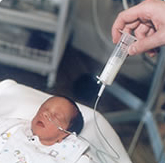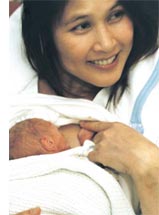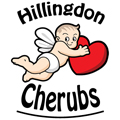Feeding your Baby
Artifical Feeding
Total Parenteral Nutrition (TPN)
'Parenteral' means 'into the blood stream', and TPN is a mixture of nutrients (such as glucose, salts, amino acids, fats and vitamins) that can be given to babies through a fine tube in a vein. This is mostly used for premature babies whose digestive systems are not yet mature enough to tolerate food.
Tube Feeding
 When babies are well enough and old enough, they can start to be given milk feeds into their stomach, starting with a small amount at first. However, most babies' sucking reflex starts to develop at around 33 weeks, so until they can suck well enough to breast feed completely, they will need to be fed by a small tube passed through the nose, or the mouth, and into the stomach. This is called a naso-gastric (if through the nose) or oro-gastric (through the mouth) tube. When babies are well enough and old enough, they can start to be given milk feeds into their stomach, starting with a small amount at first. However, most babies' sucking reflex starts to develop at around 33 weeks, so until they can suck well enough to breast feed completely, they will need to be fed by a small tube passed through the nose, or the mouth, and into the stomach. This is called a naso-gastric (if through the nose) or oro-gastric (through the mouth) tube.
When you feel ready, you might like to help tube feed your baby.
 Breastfeeding Breastfeeding
Breast milk is best for all babies, however it is particularly vital for premature and sick babies. Mums will be encouraged to express milk so that we can give this via the feeding tube. Giving breast milk early helps to protect babies against infection, and stimulate gut activity. This is especially important as premature and sick babies are at an increased risk of serious infections and gut problems. Breast milk is much more easily digested than formula milk, and also provides essential nutrients and hormones to help baby grow and develop.
Breastfeeding is also good for mothers' health, as it can help them to regain their figure (extra fat is used as energy to produce breast milk) and may reduce the risk of breast and ovarian cancer. Ask one of the nurses for Bliss's 'Breastfeeding Your Premature Baby' leaflet.
As babies mature, they can then start to be put to the breast and practice suckling. This helps the baby learn how to feed properly, and can also aid digestion. Even if you do not wish to breastfeed, we would still request that you express breastmilk for a little while if possible, as this can protect premature and sick babies from different illnesses. Expressing should begin as soon as possible (i.e. as soon as mums feel well enough) and nurses will be happy to show you how to do this. We lend out expressing kits for a £10 refundable deposit, but mums will also need to make arrangements for expressing at home after they are discharged, as our kits can only be used with the pumps located on the unit.
Supplemented feeds and Fortification
As your baby gets older, expressed breast milk may be supplemented with a breast milk fortifier to add extra calories until baby is strong enough to breastfeed. Sometimes it can be difficult to produce enough milk for a baby, so it may also be necessary to top-up breast milk with a little formula milk to make up the required volume. If babies are very premature, staff may ask permission to give 'donor' breast milk. This is donated to the hospital by other new mothers and is screened and heat-treated before use.
Bottle Feeding and Dummies
Research has shown that non-nutritive sucking (i.e. using a dummy) during tube feeds can help babies in learning to suck.
If necessary, breast milk can be fed to premature babies with a cup. If you wish to breastfeed, bottles are best avoided because their use may interfere with establishing a breast-feeding routine.
If you wish to bottle feed your baby, we can provide single use bottles and teats, however it can be useful to bring in the bottles / teats that you have at home so that baby can become used to these before discharge. |



